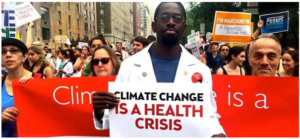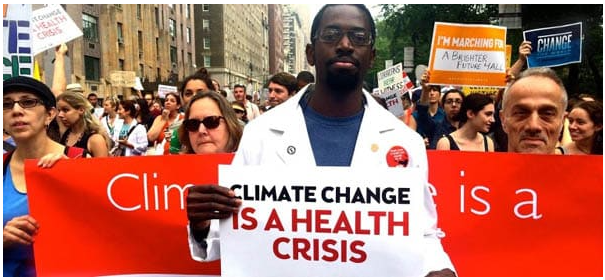The climate-health crisis
At the United Nation Climate Change Conference summits, the World Health Organization through a sculpture representing human lungs in the Health Pavilion emphasised one climate-related health danger—air pollution—in the summit’s official Blue Zone.[1]

The World Health Organization has called climate change the biggest health threat facing humanity. From extreme heat to air pollution and changing weather patterns, climate change is impacting our lives and health in increasingly debilitating ways and the need for action at scale to address the climate crisis is more urgent than ever. [2]
The resulting rise in chronic conditions such as heart disease, stroke, lung cancer and respiratory illnesses can be traced to the unmitigated effect of climate change.[3] The World Health Organization (WHO) estimates that air pollution alone causes seven million premature deaths each year.[4]
Highlights of some key health events at COP27
At the conference, the health community worked hard to ensure that the links between health and climate change were recognised by decision makers. This includes demonstrating the links between health and key negotiation items, and leveraging side events to build bridges and exchange messaging with the wider climate community.[5]

In addition, several speakers called for more research on how to help countries build resilient health systems that can absorb climate shocks and reduce the health impacts of climate crises.[6] According to these experts, the health consequences of climate change include malnutrition, injuries and deaths as a result of extreme weather events, and outbreaks of diseases such as cholera, malaria, and dengue fever with significant increases in temperatures. Heat stress may also cause mortality in children and the elderly. As the Lancet Countdown 2022 Report outlines, “the world faces a critical juncture. A health-centred, aligned response to the compounding crises can still deliver a future where people can not only survive, but thrive”.[7]

Ambition Zero Carbon
The high level meeting on ‘Transforming health systems through decarbonization and resilience’ was an opportunity to engage with key stakeholders on how to achieve health systems that are sustainable and resilient and that build community resilience and how we are delivering this in key countries and through partnership.
The session featured lively discussions about experiences from diverse health systems and contexts, where different strategies are needed to build resilience through mitigation, sustainability and adaptation.[1]
Conclusion
At the end of the summit, it was agreed that taking bold action on climate was critical and recognising the interconnection between climate and health, working with governments and policymakers around the world to advance sustainable healthcare solutions which protect patient outcomes, while reducing the environmental footprint of care. Together, everyone involved in the delivery of healthcare has a collective responsibility to reduce emissions and deliver more sustainable, resilient healthcare – for the health of people, society and the planet.
[1] https://www.who.int/news/item/03-11-2022-highlights-of-some-health-key-health-events-at-cop27
[1] WHO. Climate Change and Health. [Online] 2021.
[2] https://www.thelancet.com/journals/lancet/article/PIIS0140-6736(21)01787-6/fulltext#box1 [Last accessed: 21 February 2022]
[3] https://www.who.int/news-room/spotlight/how-air-pollution-is-destroying-our-health
[4] https://al-fanarmedia.org/2022/11/climate-change-is-a-health-crisis/
[5] https://climateandhealthalliance.org/initiatives/cop-27/
[6] https://al-fanarmedia.org/2022/11/climate-change-is-a-health-crisis/
[7] https://www.thelancet.com/journals/lancet/article/PIIS0140-6736(22)01540-9/fulltext

